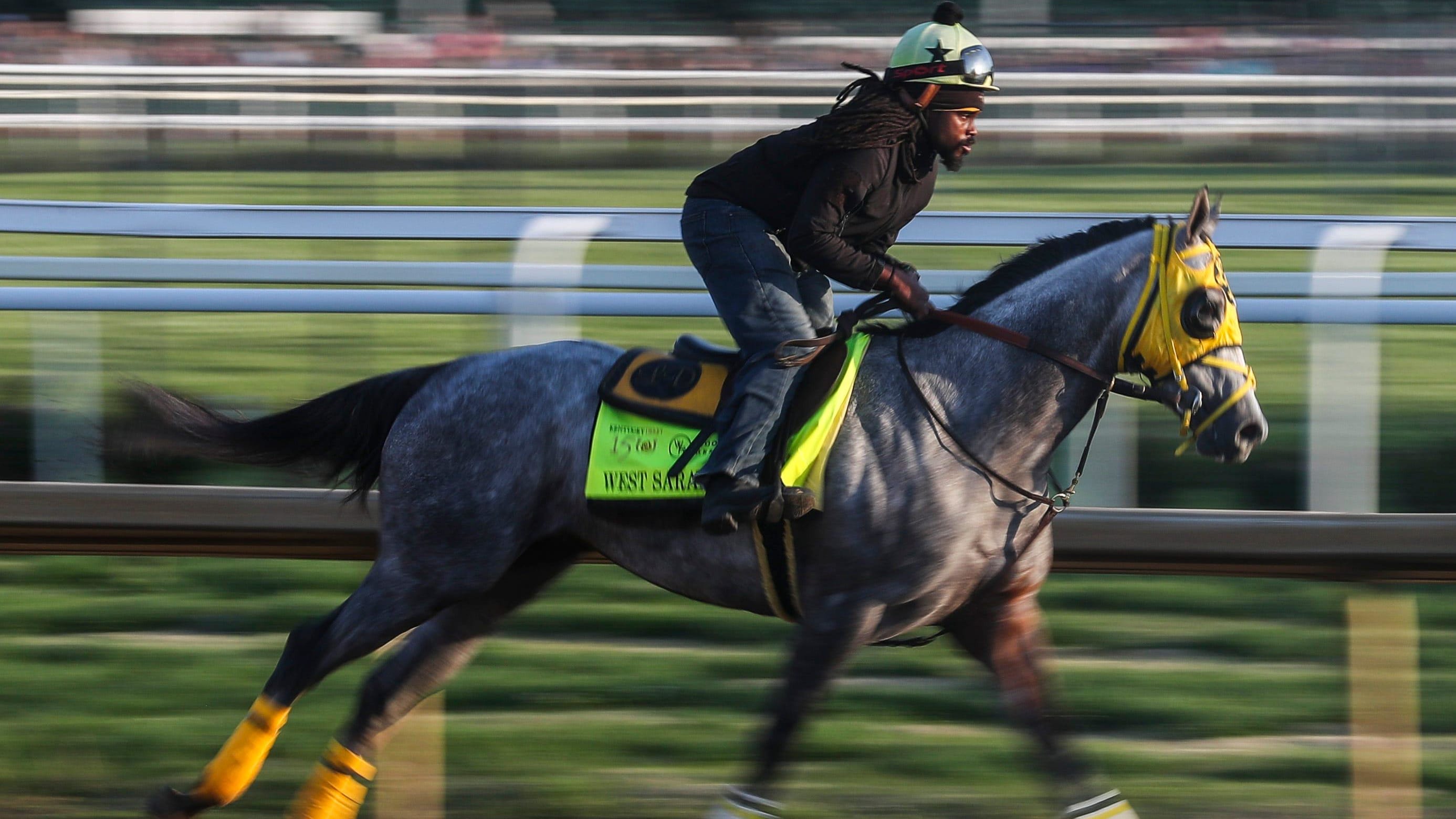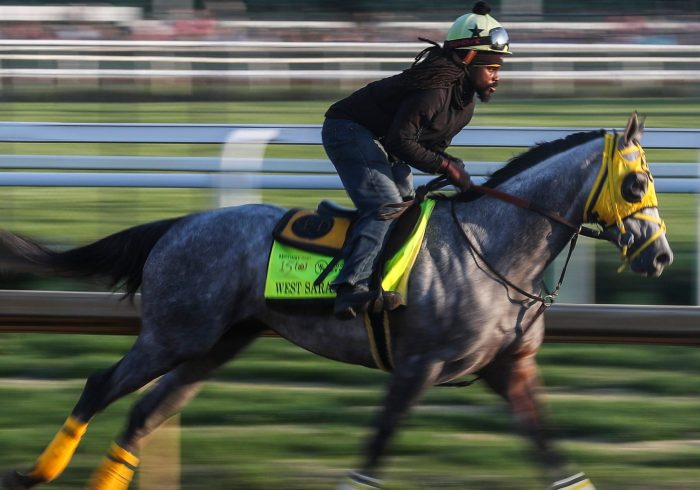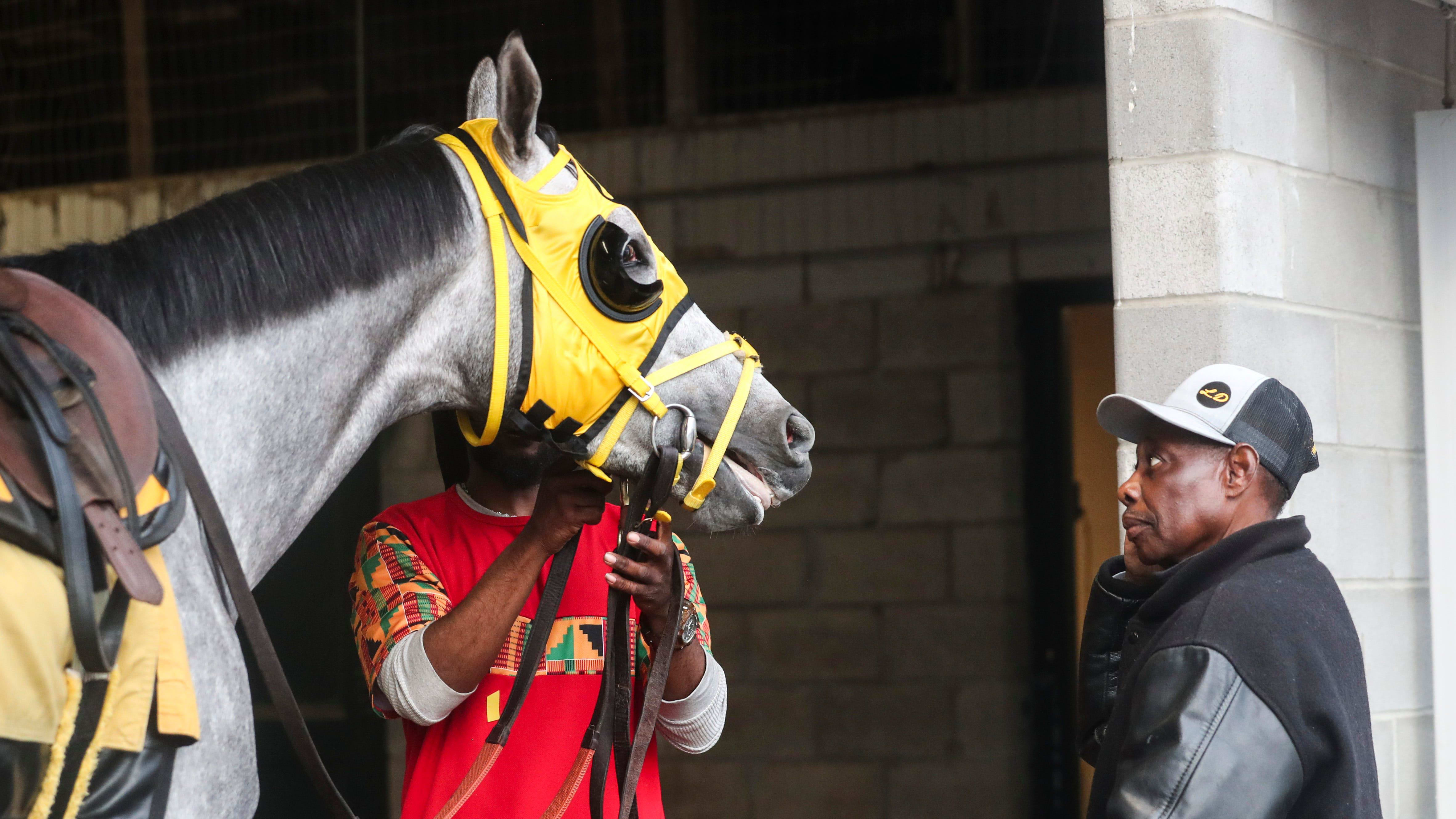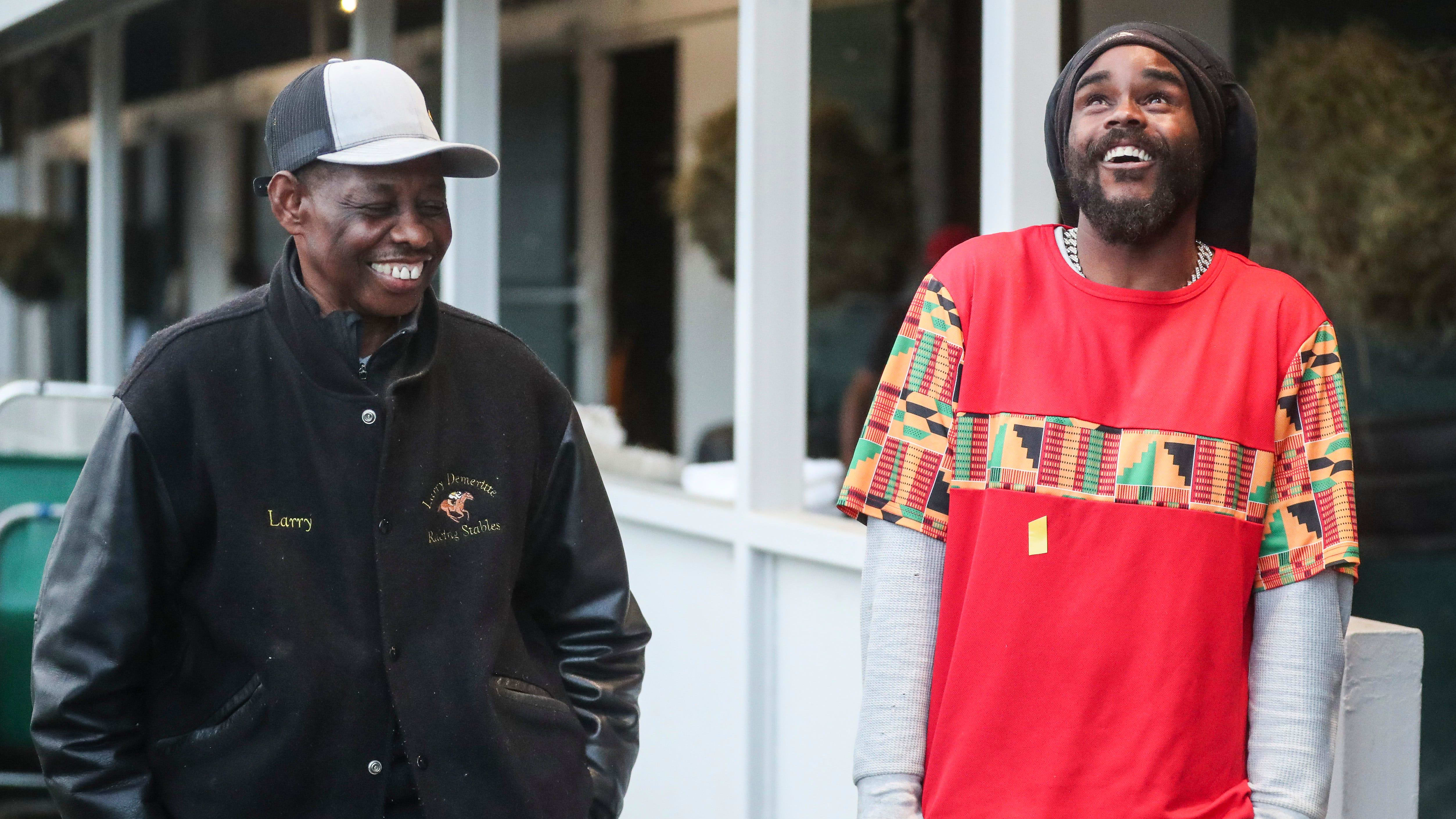Kentucky Derby Dream: Larry Demeritte Soaking Up Late-Career Climax in Unlikeliest of Ways
The chemo port is hidden beneath three layers of shirts and peals of laughter. Larry Demeritte is having far too much fun these days to waste precious time worrying about the cancer assailing his body. There is a dream horse to train, a dream race to run, a late-career climax to soak up.
Demeritte is flashing toothy smiles and telling jokes outside Barn 42 at Churchill Downs, the happiest man in racing’s happiest place this time of year. It’s the last Saturday in April, which means we’re approaching the first Saturday in May, the high holy day in American thoroughbred racing. The 70-something trainer (he won’t give up an exact age) has the first Kentucky Derby runner in his life in West Saratoga, a typical Demeritte bargain find that he’s turned into a graded stakes winner.
Demeritte eyed the gray son of Exaggerator in the auction ring in September 2022, one of the last horses up for bid at that Keeneland Yearling Sale in Lexington. He counseled owner Harry Veruchi to spend $11,000 for the colt, and Veruchi named him after the street he grew up on in Littleton, Colo. West Saratoga has since returned $460,140 in purse money on that modest initial investment.
“I buy good horses cheap,” Demeritte says. “I don’t buy cheap horses.”
Now, West Saratoga will try to win the $5 million Derby on Saturday. He is a long shot at 50–1, winless in his last four starts since capturing the Iroquois Stakes at Churchill last September. But Demeritte is an even longer shot—to be here with a horse, yes, but really to be here at all.
Demeritte says he was first diagnosed with cancer in 1996 and given five years to live. He says he was diagnosed again in 2018, and endured a bone marrow transplant at Vanderbilt University. He was given six months that time. He’s still here, radiating optimism and joy.
“I always say, doctors can’t count,” Demeritte says with a high-pitched giggle. “The doctor said I have cancer. I don’t say that, O.K.? I’m gonna do the treatments just in case they’re right, but I don’t look at it like I have anything wrong with me. I don’t ever sit and worry about what I have or what I’m dealing with.”
This is what Demeritte says he’s dealing with: multiple myeloma and amyloidosis. He gets a five-hour chemo treatment via a drip once a month in Frankfort, Ky. The most recent round of chemo was last week, knocking him back for a couple of days and limiting his duties with the string of horses he stables in Lexington. His legs swell up and fatigue sets in after working all day.
“There were some days when I didn’t think I’d survive,” he says. “I’d go to bed and I’m so sick and my prayer is, If I don’t wake up on this side, God will wake me on his side.”
The eternal wake-up call hasn’t come. And so Demeritte keeps showing up at the barn in the morning—representing his native Bahamas and diversity in horse racing, where he will be just the second Black trainer to saddle a Derby horse since 1951.
He drove his Toyota Tundra west on Interstate 64 to Louisville with a horse trailer attached and West Saratoga onboard late last week. He oversaw the colt’s final major pre-Derby workout Saturday. After a lifetime at the racetrack—including the last 48 years in the United States—the best medicine for Larry Demeritte now is seeing West Saratoga.
“Some days, my boys have to give me a ride home, I’m so sick,” Demeritte says. “But what’s the use staying at home feeling sorry for yourself, when the horses are going to bring a smile to your face watching them train? No, you’ve got to get up and go. Then go back home afterward and lie down after they make you feel good.”
Says Veruchi: “[The horse] is keeping him alive.”

West Saratoga is a long shot in the Kentucky Derby, but won the the Iroquois Stakes at Churchill last September.
Matt Stone/The Courier Journal / USA
Larry Demeritte doesn’t hunt pigeons at Churchill Downs anymore. But he did, half a lifetime ago as a fresh American immigrant, in the 1970s.
Demeritte says he was living in one of the barns on the Churchill backside where he was working as a groom. He put his childhood Boy Scout training to work, climbing on the barn roof with a slingshot to take aim at the birds that have roosted there since time immemorial. That was dinner.
“When you’re a Boy Scout, you learn survival,” he says. “So all we’d do is take a little rice, cooked rice, put it in a brown paper bag and go and get the sling and get the little birds. We put them on a hanger and barbecued them. You had to learn how to catch fire with one match. I know what it is to survive.”
Eating pigeons was part of life growing up in the Bahamas. So was going to the racetrack, where Larry’s father was a trainer. He and his brothers would get out of school at noon on Fridays and catch a ride on a neighbor’s truck to the track—against the wishes of his mom and grandmother.
“We’d get a beating every Friday night, but that didn’t matter,” Demeritte says. “We’d go every Friday to the races.”
As a teenager, Larry began training his own horses. He says he had 25 horses by age 19 and was winning training titles. But he’d been smitten by Secretariat winning the Triple Crown in 1973 and knew he wanted to experience American racing. He came to the U.S. in ’76 as a groom, starting at the bottom.
In 1977, he was the groom for Silver Series, a talented horse that won five races that year, including the Hawthorne Derby, Ohio Derby and American Derby Handicap. “I slept with this horse,” a young Demeritte told the Chicago Tribune during that summer run of wins.
By 1981, Demeritte struck out on his own as a trainer. Early returns were meager. He was 0-for-48, according to Equibase statistics, before breaking through with Tom Tale in December ’84. Demeritte’s business remained modest; he was a quintessential ham-and-egg trainer on the Kentucky circuit, working the claiming game and looking for bargains at sales.
The Derby was a dream, but a fuzzy one. Demeritte didn’t often trade in horses of that caliber. He ran some horses on the Derby Day undercard, and the 1998 Louisville Courier-Journal Derby special section included a photo of Demeritte and his wife, Beryl. The caption on the picture noted that Demeritte’s tie was “bearing the coat of arms of his native Bahamas.” (Another photo subject in the special section that year was “New York developer Donald Trump” who “brought Melania Knauss, of Vienna, Austria, to the Derby.” Trump told the paper he was betting on Stephen Got Even in that Derby; the horse finished 14th.)
The following year, Demeritte guided the $3,000 purchase of a yearling named Daring Pegasus. Veruchi was a co-owner, his first partnership with Demeritte. A strong 2-year-old campaign had the horse on the 2001 Derby Trail, but the step up in competition in Derby prep races was more than Daring Pegasus could handle.
Demeritte moved into the realm of six-figure annual purse earnings in the 2000s but never landed a breakthrough horse. In ’10, he finally recorded his first graded stakes win with Memorial Maniac (that remains Demeritte’s highest-earning year, at $459,616). He didn’t win another until West Saratoga captured the Iroquois last fall.
“I told the boys in the barn, this is our big horse,” Demeritte says. “This is the first horse I’ve trained in a long time that has gears. You have to manage him right. I feel like the route we took was the best route for him, to get him here without a lot of stress. When the right day comes with the big boys, he’ll be ready for them.”
The big boys are probably not game-planning to beat West Saratoga. But all Derby dreams are alive at this juncture, and Demeritte is as optimistic about this race as he is about his cancer fight.
“Oh, he knows he’s going to win,” says Veruchi, who walked to the old Centennial Race Track as a kid in Colorado, then went on to own a car dealership. “He says we’re going to win. I always ask him, ‘What if we don’t do good in this race, do you have a Plan B?’ No. No Plan B.
“Fifty-to-one, horse don’t know. He has no idea what the odds are. All he knows is he’s going to get out there and run his ass off.”
Time-honored tradition calls for the winning trainer of the Derby to meet the media on the Sunday morning after the race. It’s an easy duty, basking in the glow of a lifetime achievement. But if West Saratoga wins the Run for the Roses, don’t look for Larry Demeritte at Barn 42 on Sunday.
He says he will be at Fork of Elkhorn Baptist Church in Midway, Ky., as usual, taking part in worship services and a men’s discussion group. Veruchi went to church with Demeritte this past Sunday.
“My encouragement is always that the men reach out to the young men in the church,” Demeritte says of his discussion group theme. “I have a good Sunday school with a lot of men successful in life. We have to reach the younger people, so they can have hope. Kids give up too easily. That’s something I don’t want to see. I want a kid to follow their dream and find their goal in life and work at it, and be successful at it.”
The Derby has had an endless wellspring of people and animals that are easy to root for. Larry Demeritte and West Saratoga now join that age-old list. But Demeritte sees his role more as a representative for several groups than the object of affection.
He’s here for Black people in racing, who once dominated the Derby in its early days but have been marginalized for more than a century. It’s why he employs several young Black assistants, such as Donte Lowery, the exercise rider and groom for West Saratoga, who says his boss “inspires me in a big way.”
“That’s why I do what I do,” Demeritte says. “And that’s why I help keep young people around me. That’s my encouragement. I don’t want it to take this long for Donte or my other boys at the barn to have to wait this long to go to the Derby as a trainer. That’s my goal.
“We are linked. When something goes bad, they group us as a Black community. So if something good is happening for the Black community, why wouldn’t I bring them along? Let them experience the goodness of this country. There is so much good here in America. I get so upset when I see the kids not appreciating their country.”
He’s here for cancer patients. The Kentucky Oaks on Friday is a long-standing breast cancer awareness day, rife with pink regalia and a survivors’ walk on the track. Derby Day now has its own rallying cry for those fighting the disease.
“I feel, I guess, like I’m on a mission,” Demeritte says. “The Kentucky Derby’s great, but I feel it’s deeper than that. If I can be [an] encouragement to people with cancer, if I can help someone, encourage them to make their journey easier, that’s what I want to do.”
And he’s here for his Bahamian brethren. About 20 family members will be at Churchill on Saturday, many of them coming from the Bahamas, here to see a moment decades in the making and wholly improbable.
“This means a whole lot, more than really I can describe,” Demeritte says. “This goes very deep. I feel like I’m representing a lot of people, O.K.?”
Larry Demeritte is representing a lot of people with a smile on his ageless face and a chemo port in his chest. He is a long shot in the Kentucky Derby and in life, a guy who shouldn’t be at Churchill Downs Saturday—literally and figuratively. But a bargain colt has brought him this far, and now there is no keeping him away, no keeping him down.



